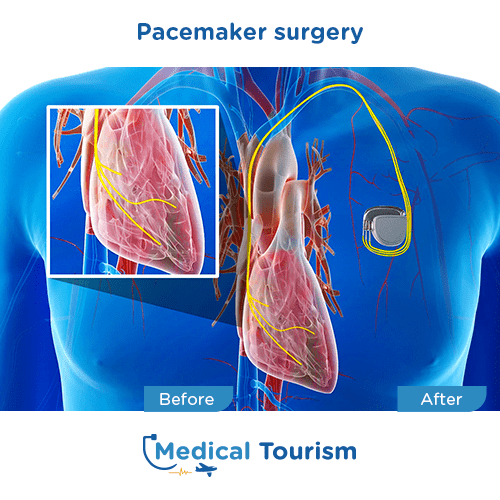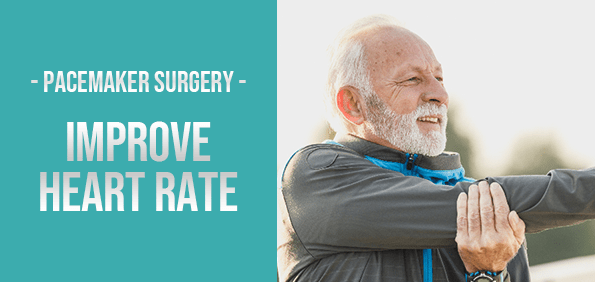The best board-certified doctors abroad
Pacemaker surgery information and international destinations
Pacemaker surgery is suggested for people with heart rhythm or rate issues, and consists of the insertion of a small electronic device that is biocompatible into the chest. This device transmits electrical impulses to aid in regulating the heartbeat.
A pacemaker has three components: a pulse generator, one or more leads, and an electrode in each lead. The pulse generator emits electrical pulses through the leads and electrode when the heartbeat is excessively slow or irregular.
Under local anesthesia, the pacemaker is implanted into the chest through a tiny incision, and the lead is then threaded through a vein and into the heart. Before the incision is closed, the pacemaker and lead are linked and checked.
Under local anesthesia, the pacemaker is implanted into the chest through a tiny incision, and the lead is then threaded through a vein and into the heart. Before the incision is closed, the pacemaker and lead are linked and checked.
Schedule a pacemaker surgery with the best international cardiologists for health tourism!
Benefits
Extended battery life
Enhances heart rate
Adaptable to your lifestyle
Lengthens the life expectancy
Enhances heart rate
Adaptable to your lifestyle
Lengthens the life expectancy
Includes
Pacemaker and its components
Pacemaker surgery
Procedure:
2 hrs.
Hospital stay: 1 hr.
Cleared to fly: 2 - 3 days
Hospital stay: 1 hr.
Cleared to fly: 2 - 3 days
After surgery
Out of town patients do not require follow-ups with the cardiologist after the procedure. Patients are clear for flying after 2 - 3 days from the pacemaker surgery. Back at home, the patient can go with any physician to remove sutures.
Note: Follow-ups can be arranged as face-to-face or virtually. If needed, you can go to your primary care physician to remove sutures or get medication adjustments.
Additional images
View additional images for this procedure.

View more


Locations
Select the city of your choice to seethe doctors profile.
Dr. Mario M. Minghetti
View more

Pacemaker surgery frequent questions
Get answers to our most frequently asked questions and what to expect after the surgery.
Do I qualify for pacemaker surgery?
Patients who are having surgery typically have a sluggish pulse that causes fatigue, shortness of breath, or even heart failure.
Will the procedure hurt?
You won't feel any discomfort throughout the surgery since the doctors will numb your chest with local anesthesia, but you will remain conscious. Around where the cardiologist is working, you might feel some pressure.
What happens after surgery?
You must remain in the hospital after surgery to receive ongoing monitoring. You could discover some bruising at the incision site when you get home. Some patients may experience discomfort when resting in particular postures.
When do the batteries need to be changed?
The anticipated battery life is 5 to 15 years. The battery must be replaced when it runs out of power using a quicker and less invasive surgical procedure.
What safety measures do I need to follow post-surgery?
When exposed to certain devices for extended periods of time, such as microwaves, metal detectors, or high-voltage transformers, your pacemaker's regular functions may be affected. Furthermore, try to keep your cellphone away from your pacemaker.
Disclaimer: This information does not reflect the medical advice from our clinics. All cases are different and this treatment may not suit you. Always refer to a medical professional with the certification and experience. All of our physicians are fully qualified to perform these procedures. For more information and diagnosis contact one of our top specialized clinics.
In all medical procedures, there are chances of complications, the specialist will provide you detailed information about the risks of the procedure, talk to the specialist directly.
In all medical procedures, there are chances of complications, the specialist will provide you detailed information about the risks of the procedure, talk to the specialist directly.

